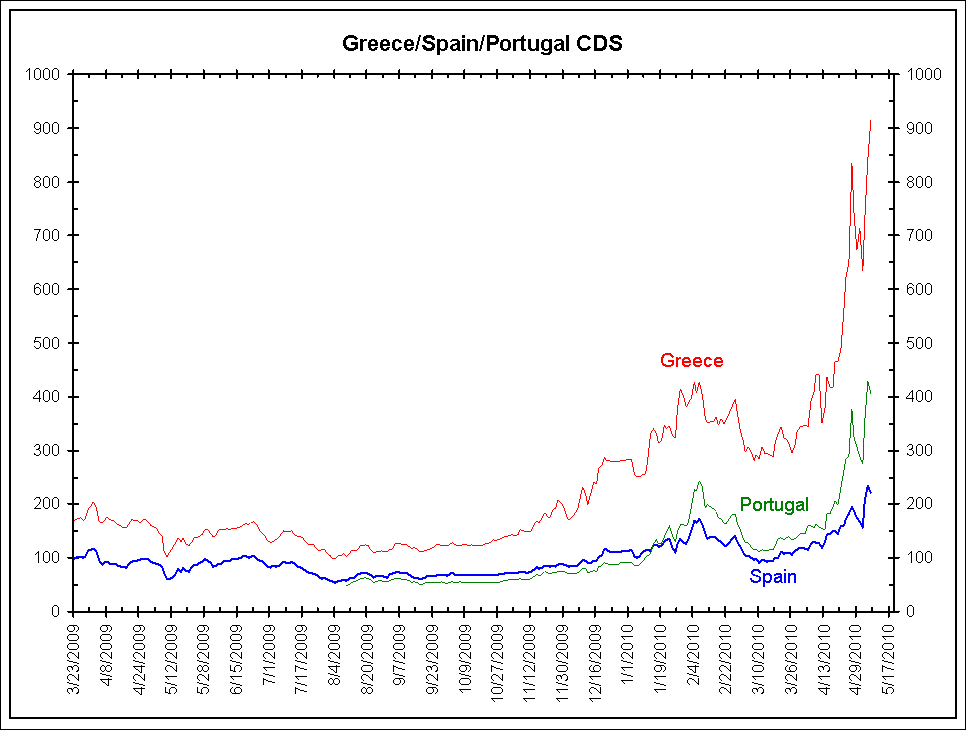<Click on chart for larger image>
• Bloomberg.com – Weber Draws Battle Lines as Pressure Mounts on ECB
Bundesbank President Axel Weber fired the first shot in a brewing debate over how far the European Central Bank should go to defend the euro. As the single currency plunged yesterday, Weber said the threat of contagion from Greece’s fiscal crisis doesn’t merit “using every means,” rebuffing calls for the ECB to consider buying government bonds. The central bank’s Governing Council meets today in Lisbon, the latest capital to be hit by the fiscal meltdown that’s shaking the foundations of Europe’s monetary union. ECB President Jean-Claude Trichet is under pressure to do more to calm markets after the pledge of a 110 billion-euro ($142 billion) bailout for Greece from euro-area countries and the International Monetary Fund failed to assuage investors’ concerns. While Weber’s comments suggest he won’t agree to asset purchases, some economists said that remains an option if the crisis worsens. The ECB could also reverse the withdrawal of emergency lending measures used to fight last year’s recession and dilute collateral rules further.
• The Financial Times – Short View: Central bank intervention
Central bank intervention in currency markets can grab headlines. This is usually regarded as a legitimate tactic, if a shocking one. Intervention in the bond markets is quite another story. Even though the Bank of England, the Federal Reserve and the European Central Bank have all taken debt purchases from their toolkits in the past two years, extending their use is controversial. The ECB is today likely to speak about this topic. The announcement of a rescue package for Greece has not been enough to quell market jitters. Indeed, more investors seem nervous now about a Greek default than they did before the package was announced…The risks of buying bonds are plenty, not just for the ECB. Will it damage its reputation as an inflation hawk? Investors betting against eurozone government credits could be left with big losses if an intervention catches them by surprise. The conversation about whether the ECB should become the buyer of last resort is vital, however, especially as the eurozone debt market remains so strained. With currency interventions no longer in eurozone central bankers’ bag of tricks, bond market interventions may need to be.
• The Financial Times – Lex: The euro: going south
After 12 years imitating the Bundesbank, the European Central Bank is suddenly acting more like the Bank of the Mediterranean. The crisis in Greece has shifted the focus of eurozone policymakers sharply to the south. Already the ECB has suspended the minimum credit requirements required for Greek government-backed collateral. A move towards quantitative easing would be a drastic but not unthinkable next step. Today the ECB itself is heading south – to Lisbon, appropriately enough, for its governing council meeting…The immediate problem for the ECB, of course, is the threat of contagion beyond Greece. But at the same time the central bank should remember it is a body responsible for monetary policy – it does not have the mandate to go around directly plugging fiscal holes. Any emergency move to start buying government bonds opens up a very large can of worms. At all costs, the bank must resist any pressure from within the eurozone or beyond to blur the lines between monetary and fiscal policy.



What's been said:
Discussions found on the web: